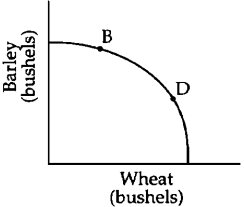Exam 3: The Fundamental Economic Problem: Scarcity and Choice
Exam 1: What Is Economics?227 Questions
Exam 2: The Economy: Myth and Reality150 Questions
Exam 3: The Fundamental Economic Problem: Scarcity and Choice250 Questions
Exam 4: Supply and Demand: An Initial Look308 Questions
Exam 5: Consumer Choice: Individual and Market Demand202 Questions
Exam 6: Demand and Elasticity209 Questions
Exam 7: Production, Inputs, and Cost: Building Blocks for Supply Analysis216 Questions
Exam 8: Output, Price, and Profit: The Importance of Marginal Analysis189 Questions
Exam 9: Securities: Business Finance, and the Economy: The Tail that Wags the Dog?198 Questions
Exam 10: The Firm and the Industry under Perfect Competition208 Questions
Exam 11: Monopoly203 Questions
Exam 12: Between Competition and Monopoly225 Questions
Exam 13: Limiting Market Power: Regulation and Antitrust152 Questions
Exam 14: The Case for Free Markets I: The Price System220 Questions
Exam 15: The Shortcomings of Free Markets212 Questions
Exam 16: The Market's Prime Achievement: Innovation and Growth110 Questions
Exam 17: Externalities, the Environment, and Natural Resources217 Questions
Exam 18: Taxation and Resource Allocation219 Questions
Exam 19: Pricing the Factors of Production228 Questions
Exam 20: Labor and Entrepreneurship: The Human Inputs223 Questions
Exam 21: Poverty, Inequality, and Discrimination167 Questions
Exam 22: An Introduction to Macroeconomics211 Questions
Exam 23: The Goals of Macroeconomic Policy207 Questions
Exam 24: Economic Growth: Theory and Policy223 Questions
Exam 25: Aggregate Demand and the Powerful Consumer214 Questions
Exam 26: Demand-Side Equilibrium: Unemployment or Inflation?210 Questions
Exam 27: Bringing in the Supply Side: Unemployment and Inflation?223 Questions
Exam 28: Managing Aggregate Demand: Fiscal Policy205 Questions
Exam 29: Money and the Banking System219 Questions
Exam 30: Monetary Policy: Conventional and Unconventional205 Questions
Exam 31: The Financial Crisis and the Great Recession61 Questions
Exam 32: The Debate over Monetary and Fiscal Policy214 Questions
Exam 33: Budget Deficits in the Short and Long Run210 Questions
Exam 34: The Trade-Off between Inflation and Unemployment214 Questions
Exam 35: International Trade and Comparative Advantage226 Questions
Exam 36: The International Monetary System: Order or Disorder?213 Questions
Exam 37: Exchange Rates and the Macroeconomy214 Questions
Select questions type
Figure 3-1
 -The shape of the production possibilities frontier in Figure 3-1 implies that
-The shape of the production possibilities frontier in Figure 3-1 implies that
(Multiple Choice)
4.8/5  (42)
(42)
A society's decision to produce more tanks may require it to forgo production of some cars.
(True/False)
4.9/5  (35)
(35)
Since it spent over $3.6 trillion in 2010, opportunity cost was not an issue for the U.S.government.
(True/False)
4.7/5  (46)
(46)
According to the law of comparative advantage, a doctor who is also a talented auto mechanic should
(Multiple Choice)
5.0/5  (39)
(39)
As a general rule, an increase in the capital available to a society
(Multiple Choice)
4.7/5  (31)
(31)
If Japan and the United States engage in trade, and Japan gains as a result of the trade, does that mean the United States has lost in some manner?
(Essay)
4.8/5  (42)
(42)
High opportunity costs go hand in hand with high money costs in a properly functioning economy.
(True/False)
4.9/5  (43)
(43)
As the term "opportunity cost" is defined in the text, the opportunity cost of going to college includes
(Multiple Choice)
4.9/5  (41)
(41)
What is the basic task that economists expect the market to carry out?
(Multiple Choice)
4.8/5  (35)
(35)
You have invested $1,000 in a stock whose price is increasing at 10 percent a year.Your stock broker, who is never wrong, recommends a stock rising at 20 percent a year.Assuming the broker earns 4 percent of the stock's value on any purchase or sale of the stock, should you take her recommendation?
(Essay)
4.8/5  (31)
(31)
According to Baumol and Blinder, recognition of the usefulness of markets
(Multiple Choice)
4.8/5  (41)
(41)
The statement "Resources employed in producing X are better suited to making Y" is another way of saying resources
(Multiple Choice)
4.9/5  (38)
(38)
Both conservatives and liberals tend to approve of markets because
(Multiple Choice)
4.8/5  (34)
(34)
What is division of labor? How does it raise efficiency and productivity?
(Essay)
4.9/5  (38)
(38)
Generally, the opportunity cost and the money cost of a good
(Multiple Choice)
4.8/5  (37)
(37)
Showing 161 - 180 of 250
Filters
- Essay(0)
- Multiple Choice(0)
- Short Answer(0)
- True False(0)
- Matching(0)